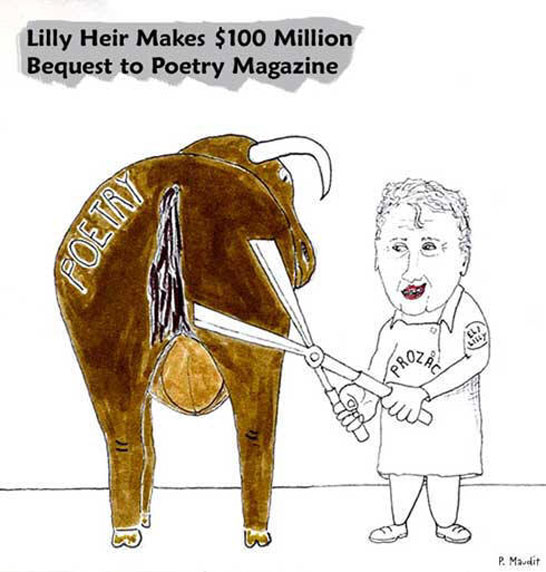The American Dissident: Literature, Democracy & Dissidence
Poetry Magazine
Chicago, IL. September 2007. Vol. CXC. No. 5. Flatbound. $35/year subscription.
Assuming the poems would be high-brow tedious, I leaf directly to the most promising essay, “Poetry and the Problem of Taste,” by Brian Phillips. The first part of it, however, is a bit verbose for my tastes and is, in fact, an historical discussion on “good taste,” though oddly without mention of the word “bourgeois.”
 In the second part, however, I learn something new: “anxiety is so widespread in the poetry culture” that it “dominates the culture of poetry in this country.” I’d thought the culture was rather dominated by rampant backslapping, self-congratulating, sycophancy, disengagement, careerism, exclusion, and lack of questioning and challenging of its institutions and starlets. The anxiety, however, is understandable, especially for poets hungry for fame, because it results from poetry’s purported irrelevance regarding society. The third part of the essay reverts back to “good taste” and argues “there is now virtually no sense among poetry readers of a fixed and commonly accessible standard of aesthetic value.” Au contraire, I’m convinced such a standard exists in the realm of the established-order milieu (Poetry mag included) and is being taught in the nation’s MFA poetry programs. How many times has my writing been rejected over the years because, in the words of editors, it lacked “good taste”! Yeah, you’ll know what it is, when you taste it!
In the second part, however, I learn something new: “anxiety is so widespread in the poetry culture” that it “dominates the culture of poetry in this country.” I’d thought the culture was rather dominated by rampant backslapping, self-congratulating, sycophancy, disengagement, careerism, exclusion, and lack of questioning and challenging of its institutions and starlets. The anxiety, however, is understandable, especially for poets hungry for fame, because it results from poetry’s purported irrelevance regarding society. The third part of the essay reverts back to “good taste” and argues “there is now virtually no sense among poetry readers of a fixed and commonly accessible standard of aesthetic value.” Au contraire, I’m convinced such a standard exists in the realm of the established-order milieu (Poetry mag included) and is being taught in the nation’s MFA poetry programs. How many times has my writing been rejected over the years because, in the words of editors, it lacked “good taste”! Yeah, you’ll know what it is, when you taste it!
As for the poetry in this issue, Indian poems are featured and prove diverse in theme, including Palestine, eunuchs, and Moscow and are, in general, surprisingly readable and socially engaged. An essay by Parthasarathy, “Indian Poetry Today,” follows the poems and presents an interesting survey. It notes, for example, two general social tendencies in modern Indian poetry: Dalit (that written by Untouchables) and feminist. How not to feel the depth of the following Dalit verse taken from Azhagiya Periyavan’s “At First It Is Ours”:
We have wiped off your filth
that blinded our eyes.
We have smashed the locks
you gagged our mouths with.
From now on, you better pay
attention to what we say.
The poems beginning this issue (written by Americans?) and not Indian are predictably disengaged. The first one, by Mary Kinzie, “Looking Forth,” is characterized by an unoriginal flurry of word acrobatics, including “sunflat ash trunks/ the vertical gray/ of hitting your head/ against the color.” Well, maybe that’s not so bad, but I’m for fond over forme any time.
—The Editor
